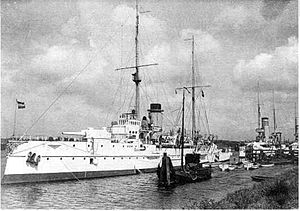From Wikipedia, the free encyclopedia
The Dutch–Venezuelan crisis of 1908 was a dispute that broke out between the Netherlands and Venezuela after the Venezuelan president, Cipriano Castro, cut off trade with the Dutch Caribbean island of Curaçao.
This article has multiple issues. Please help improve it or discuss these issues on the talk page. (Learn how and when to remove these messages)
|
| Dutch–Venezuelan Crisis | |||||||
|---|---|---|---|---|---|---|---|
 The Dutch warship Jacob van Heemskerck | |||||||
| |||||||
| Belligerents | |||||||
| Venezuela | Netherlands | ||||||
| Commanders and leaders | |||||||
| Cipriano Castro | Wilhelmina of the Netherlands | ||||||
| Strength | |||||||
|
1 pantserschip (coastal defence ship) 2 protected cruisers | |||||||
Venezuela expelled the Dutch ambassador, prompting a Dutch dispatch of three warships: Jacob van Heemskerck, Gelderland, and Friesland.[disputed – discuss] The Dutch warships had orders to intercept every ship that was sailing under the Venezuelan flag. On 12 December, Gelderland captured the Venezuelan coast guard ship Alix (Alejo in Spanish) off Puerto Cabello.[2] She and another ship, 23 de Mayo, were interned in harbor of Willemstad.
A few days later, on 19 December 1908, Vice President Juan Vicente Gómez seized power in Caracas during the absence of President Castro, who had left for Berlin for a surgical operation, installing himself as de facto president.[3] Gómez reverted Castro's measures in the following days, and the Netherlands proceeded to withdraw its warships.[4]
Seamless Wikipedia browsing. On steroids.